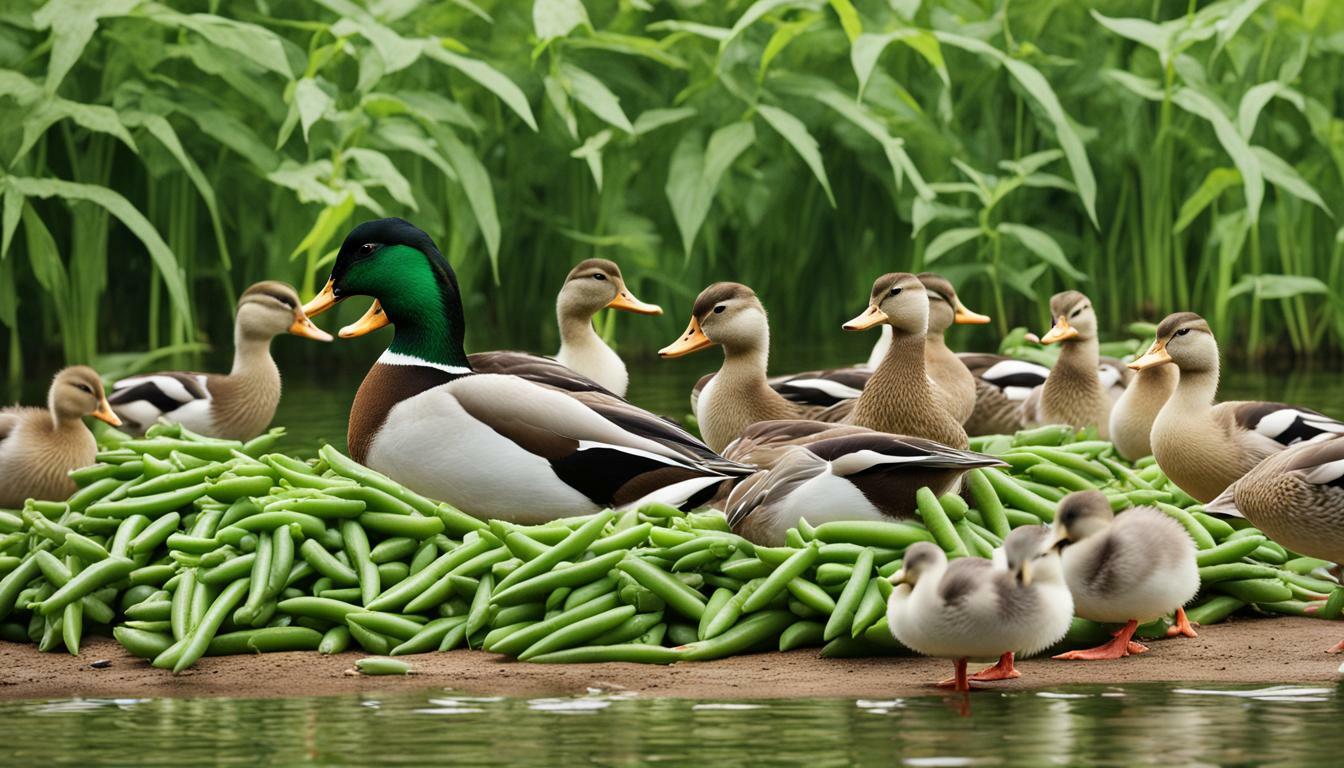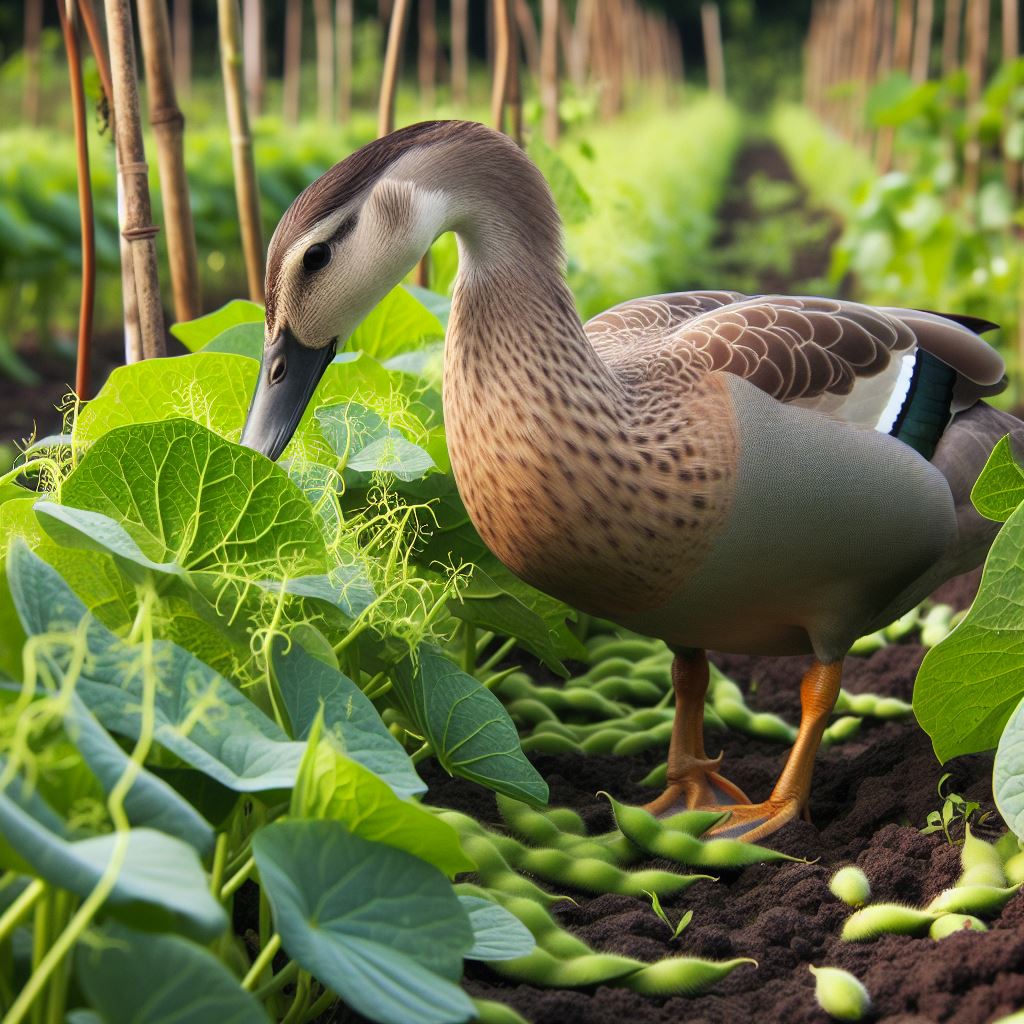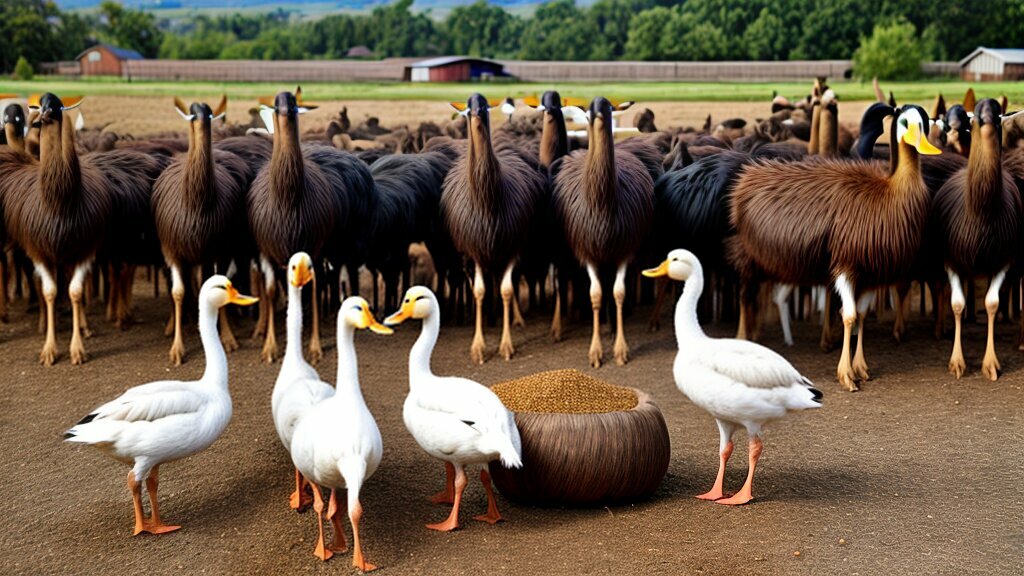Can Ducks Have Green Beans? Facts and Feeding Tips

Table of content:
Have you ever wondered if you can share some of your healthy green beans with your feathered friends? Green beans are a nutritious vegetable for humans, but can ducks eat them too?
As a loving duck owner, you want to make sure you’re feeding your ducks a healthy, balanced diet. One way to add variety to their meals is by offering fresh fruits and vegetables. But which ones are safe for ducks to eat?
In this comprehensive guide, we’ll cover everything you need to know about feeding green beans to ducks.
Can I Feed My Ducks Green Beans?
Green beans are safe for ducks to eat and provide nutritional benefits. Both domesticated and wild ducks can eat green beans as part of a balanced diet.
Green beans contain vitamin C, vitamin K, folate, manganese, and fiber. This makes them a healthy supplement to a duck’s regular diet.
Ducks’ digestive systems are designed to handle a variety of fruits, vegetables, grains, and proteins. The hardy duck stomach can break down raw green beans efficiently.
So the short answer is yes, green beans can be fed to ducks safely as an occasional treat. But there are some things to keep in mind when serving green beans to ensure your ducks enjoy them and reap the benefits.
Are Green Beans Healthy for Ducks?
Green beans pack a punch of valuable vitamins, minerals, and fiber that benefit duck health. Here are some of the top nutrients ducks can gain from green beans:
- Vitamin C: Important for immune health and collagen production. Also acts as an antioxidant.
- Vitamin K: Supports bone health and wound healing.
- Folate: Essential for new cell and DNA production and growth.
- Manganese: An antioxidant that aids bone development, metabolism, and nutrient absorption.
- Fiber: Promotes healthy digestion and nutrient absorption.
Green beans also provide smaller amounts of other vitamins and minerals like vitamin A, iron, magnesium, potassium, and phosphorus.
When fed in moderation along with a balanced main diet, green beans make an excellent supplemental food for ducks. The nutrients support overall health, growth, and development.
What Types of Green Beans Can Ducks Eat?
Ducks can eat most common varieties of fresh green beans:
- Snap beans: Classic crisp, juicy green beans. Common types are Blue Lake, Contender, and Kentucky Wonder.
- French beans: A flat type of snap bean. Varieties like Romano are more tender than round snap beans.
- Wax beans: Yellow or purple pods with a more delicate flavor. Include Golden Wax and Dragon Tongue.
- Yard Long beans: An extra long (up to 1 foot!) heirloom Asian bean. More tender than standard green beans.
- Haricots verts: A thin French green bean renowned for its flavor and crunch.
- Chinese long beans: An Asian variety that tastes similar to green beans but with more nutrients.
Avoid feeding ducks the following varieties:
- Dry, undercooked beans: Raw beans contain phytohemagglutinin, which is toxic.
- Frozen or canned green beans: Often high in preservatives. Stick to fresh.
When introducing any new food, feed a small amount at first to ensure your ducks tolerate it well. Then slowly increase portion sizes.
How to Prepare and Serve Green Beans for Ducks
Before serving green beans to ducks, give them a quick rinse under cool water. Chop the beans into small, bite-sized pieces. Ducks don’t have teeth and need help breaking the veggies into edible pieces.
For young ducklings, chop the beans extra fine or even mash them. Their digestive systems are still developing.
Light steaming or blanching the green beans makes them softer and easier to digest while retaining nutrients. Avoid overcooking them into mush. The beans should still have some firmness.
Let the chopped green beans cool to room temperature before feeding to ducks. You can serve them:
- Sprinkled over the ducks’ regular food.
- In a separate treat dish.
- Scattered in the ducks’ living area to forage for.
If your ducks ignore plain green beans at first, entice them with a few crushed peas or corn mixed in.
How Much Green Beans to Feed Ducks
Green beans should be fed as a supplemental treat 2-3 times per week at most. They are not meant to be a main food source.
The proper portion size depends on the number and size of your ducks. Here are some general green bean feeding guidelines:
- For 1-3 medium ducks, feed 1⁄4 to 1⁄2 cup chopped green beans per meal.
- Small ducklings can have 1-2 tablespoons each.
- Larger duck breeds like Pekins can have up to 1 whole cup.
- Adjust amounts based on your ducks’ enthusiasm and maintain a balanced diet.
Monitor your ducks as they try green beans for the first time. Reduce portions if they have diarrhea or other signs of digestive upset after eating them.
Never leave large amounts of green beans sitting out in ducks’ living space, as they will likely overindulge and get sick. Completely remove any uneaten portions after an hour or two.
Potential Risks of Feeding Ducks Green Beans
Green beans are safe for ducks when fed properly. However, problems can occur if ducks eat too many. Some potential risks include:
- Weight gain: Too many starchy vegetables like green beans can lead to excess calories and obesity.
- Nutritional imbalance: Overfilling on green beans may cause ducks to fill up before eating a balanced meal.
- Intestinal upset: Eating more green beans than their digestive system can handle may cause loose stools or diarrhea. Reduce portions or stop feeding for a few days if this occurs.
- Choking hazard: Chop all green beans to prevent ducks from swallowing pieces whole and choking.
- Biotoxins: Spoiled, moldy, or wilted green beans can cause illness from biotoxins. Only feed fresh, crisp beans.
As long as you feed green beans in moderation as part of a varied diet, ducks can enjoy their nutrients safely. Monitor servings based on age, health conditions, and breed size.
7 Other Fruits and Vegetables Ducks Can Eat
In addition to green beans, ducks enjoy many other fruits and vegetables. Offer a diverse mix for balanced nutrition. Good options include:
1. Kale and Spinach
Dark leafy greens like kale and spinach contain vitamins A, C, K, calcium, and antioxidants. Chop the leaves and stems into small pieces for ducks.
2. Sweet Corn
A favorite treat! The complex carbs, vitamins, and minerals in fresh corn support duck health. Remove corn from the cob before feeding.
3. Peas
Both fresh and frozen peas make a yummy, high-protein snack. Thaw frozen peas first. Feed peas in moderation due to their starchiness.
4. Chopped Carrots
Chopped raw baby carrots are great for ducks. They provide vitamin A for eyesight, skin, feathers, and health.
5. Cooked Pumpkin or Winter Squash
Cook and mash pumpkin or butternut squash, then let ducks forage for the tasty orange flesh. Great for vitamins A and C.
6. Sliced Tomatoes
Ripe tomatoes offer an acidic treat ducks love. Red varieties have the antioxidant lycopene. Avoid unripe green tomatoes, which are toxic.
7. Chopped Fruit
Chop melons, berries, apples, mangos, and other fruits into bite-sized pieces. Fresh or frozen. Citrus fruits can be acidic, so monitor to prevent upset stomachs.
Rotate through a diverse mix of fruits and veggies to keep your ducks happy and healthy! Always chop produce into small pieces the appropriate size for your ducks. Offer a few new foods each week and watch for any signs of digestive upset.
Final Thoughts
Raising healthy, happy ducks is deeply fulfilling. With their unique personalities, ducks make wonderfully engaging pets.
As a responsible owner, you want to feed your flock as best as you can. By offering treats like green beans along with their complete feed, you provide natural nutrition ducks flourish on.
Vary their fruits and vegetables often for an appealing, balanced diet. It’s satisfying to watch your ducks eagerly devour each new food. Work produce like green beans into their meals a few times a week.
Bonding with your ducks over healthy fresh foods is a true joy. Carefully sharing the fruits and veggies we love is one way we can nourish the animals who bring so much to our lives.
Welcome. I’m Adreena Shanum, the proud owner of this website, and I am incredibly passionate about animals, especially poultry. I founded adreenapets.com as a labor of love, stemming from my desire to share my knowledge and experiences with poultry enthusiasts worldwide.




